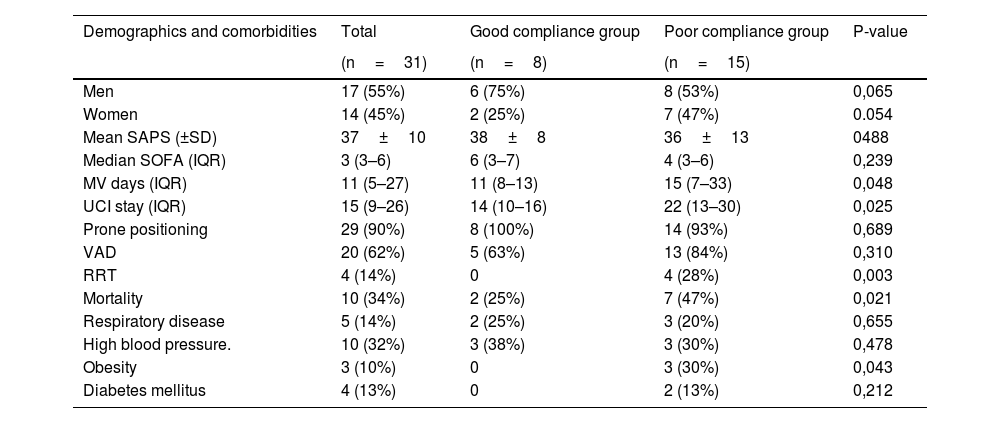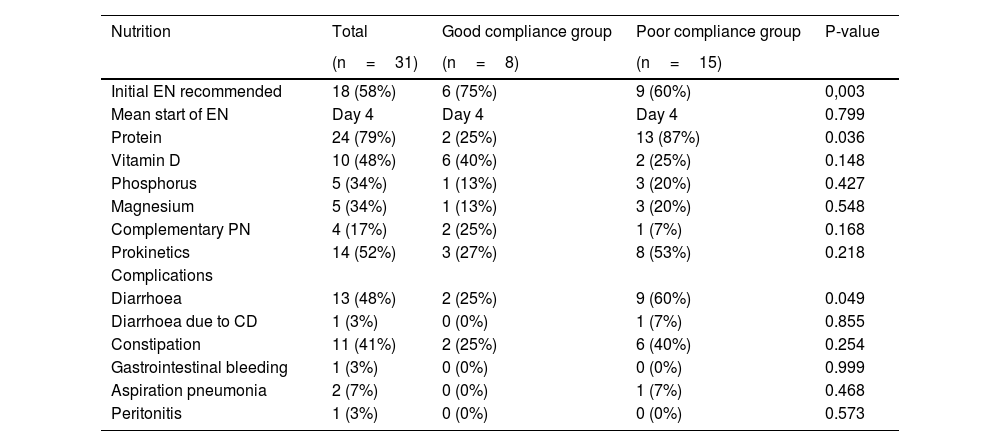The critical patient affected by SARS-CoV-2 is at risk of malnutrition. The need to avoid volume overload and manoeuvres that delay reaching nutritional requirements such as pronation make the nutritional approach to these patients complex. To ensure adequate treatment, a nutritional support protocol was developed as a clinical practice guideline adapted to the COVID-19 patient.
ObjectiveTo describe and analyse the results of introducing a nutritional support protocol aimed at SARS-CoV-2 patients admitted to the intensive care unit (ICU) of the Consorcio Hospital General Universitario de Valencia (CHGUV) from March to May 2020.
Material and methodsObservational, descriptive, retrospective and longitudinal design to evaluate compliance with a nutritional support protocol.
ResultsThirty-one consecutive patients were included but nutritional follow-up could not be performed in eight. Of the remaining 23 patients, only eight reached 80% of caloric requirements before the tenth day after starting treatment (good compliance group) and 15 after the eleventh day (poor compliance group). In the group with «good compliance» 75% (n=6) were discharged and 25% died (n=2), compared to the group with «bad compliance» where 53% (n=8) were discharged and 47% (n=7) died (Chi square test, p-value=0.019). Those patients who reached 80% of caloric needs during ICU stay had a shorter length of stay compared to those who did not (median days of admission=14, IQR=10-16 and median days of admission=22, IQR=13-39, p-value=0.025).
ConclusionsIntroducing a nutritional protocol during the first weeks of the SARS-CoV-2 pandemic could improve clinical outcomes by promoting healing and reducing associated complications.
El paciente crítico afectado por SARS-CoV-2 tiene riesgo de desnutrición. La necesidad de evitar la sobrecarga de volumen y las maniobras que retrasan el logro de los requerimientos nutricionales como la pronación hacen que el abordaje nutricional de estos sujetos sea complejo. Para asegurar un tratamiento adecuado, se desarrolló un protocolo de soporte nutricional como guía de práctica clínica adaptado al paciente con COVID-19.
ObjetivoDescribir el protocolo de soporte nutricional creado en nuestro centro, el cumplimiento del mismo y analizar los resultados de su aplicación en los pacientes con SARS-CoV-2, ingresados en la unidad de cuidados intensivos (UCI) del Consorcio Hospital General Universitario de Valencia (CHGUV) de marzo a mayo del 2020.
Material y métodosDiseño observacional, descriptivo, retrospectivo y longitudinal para evaluar el cumplimiento de un protocolo de soporte nutricional.
ResultadosSe incluyeron 31 pacientes. No se pudo establecer un seguimiento nutricional en ocho de ellos. De los 23 restantes, ocho alcanzaron 80% de los requerimientos calóricos antes del décimo día tras el inicio del tratamiento (grupo buen cumplimiento) y 15 a partir del undécimo día (grupo mal cumplimiento). El grupo con buen cumplimiento obtuvo 75% (n=6) de curación y 25% de éxitus (n=2), en comparación con el grupo con «mal cumplimiento» donde 53% (n=8) fueron dados de alta a planta vs 47% (n=7) que fallecieron (prueba X2, valor p=0,019). Aquellos pacientes que alcanzaron 80% de las necesidades calóricas en algún momento del ingreso en UCI tuvieron menor duración de la hospitalización frente a los que no lo obtuvieron (mediana de días de ingreso=14, rango intercuartílico [IQR]=10-16 y mediana de días de ingreso=22, IQR=13-39, valor p=0,025).
ConclusionesLa creación de un protocolo nutricional durante las primeras semanas de la pandemia por SARS-CoV-2 podría estar asociada con una mejoría de los resultados clínicos al favorecer la curación y disminuir las complicaciones asociadas.










